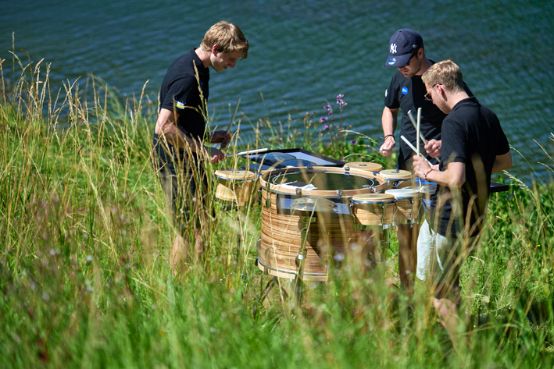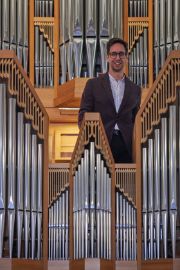Davos Festival: Suitable for corona and keen to experiment
Marco Amherd is following in the footsteps of his predecessors with his first festival directorship in Davos.

Marco Amherd has just sat on the organ bench and performed Johann Sebastian Bach's Fugue in D major BWV 532/2 with virtuoso pedal use and great transparency at the lunchtime concert in St. Theodul Church. Now the new director of the Davos Festivals Time for an in-depth conversation. His performance as organist in a concert at the halfway point of the festival was the only one in which Amherd also made a musical appearance.
-

Artistic Director Marco Amherd played Bach's works in the church of St. Theodul. Photo: Davos Festival / Yannick Andrea
Nevertheless, the 32-year-old from Valais is omnipresent at the festival, maintaining close contact with the artists, attending rehearsals and the wonderful festival hike to Davos Wiesen in hiking boots and shorts and personally announcing every concert. After conductor Graziella Contratto, clarinettist Reto Bieri and pianist Oliver Schnyder, who was only in charge of last year's festival edition, it is the intention of the Foundation Board that Marco Amherd should once again be the artistic director. What is special about Davos, however, is that the artistic director is hardly expected to make a musical appearance here. What is needed is his expertise in selecting musicians, his network and his practical know-how as an artist. What attracts organist and choir conductor Marco Amherd to his new job? "I like making programs. I want to weave a common thread and give the concerts an arc of suspense. I also think it's important to break with conventions and find new concert forms. A lot is possible at the Davos Festival. You can be experimental here, because it's okay for something to go wrong."
"From the senses"
The new artistic director was already confident in spring that the festival would be able to take place in compliance with the coronavirus. Instead of international stars performing standard works, each program is exclusive and produced locally. The fact that the ninety or so young musicians from fourteen countries, almost all of them under thirty, arrived safely in the town, which is 1500 meters above sea level, is thanks to the organizational talent of managing director Anne-Kathrin Topp. For many of them, this is their first performance since the outbreak of the coronavirus pandemic.
"Von Sinnen" is the name of this year's beautifully ambiguous festival motto, which will be explored with relish in the individual concerts. In the church of St. Johann in Davos Platz, Bernd Franke's expressive composition On the Dignity of Man The young, expressive Sibja Saxophone Quartet and the exquisite Davos Festival Chamber Choir under the direction of Andreas Felber vividly demonstrate their experimental side. The four highly talented musicians show their experimental side in the world premiere of from the noise of their baritone saxophonist Joan Jordi Oliver in the Davos Wiesen church. The live noises and sounds are digitally processed and sent into the church, a little too sharp in the treble. The Swiss Colores Trio enchants not only the participants of the traditional brunch at Schwarzsee in Davos Laret, when Fabian Ziegler, Matthias Kessler and Luca Staffelbach play Astor Piazzolla's Libertango let it groove. With their own complex arrangements of Ravel's Le tombeau de Couperin and Saint-Saëns' Danse macabre the three young percussionists in the St. Johann church demonstrate great musicality in addition to their virtuoso skills. At the "Liebessinn" evening at the Hotel Schweizerhof, the Simply Quartet let Robert Schumann's A major String Quartet op. 41 No. 3 languish at the highest level, while actor Elias Reichert traces the demanding feelings in Robert's letters to Clara: "It has to be. Don't forget the yes."
Stories in special places
Marco Amherd wants to "tell stories" with his programs. The connection to literature is also important to him. The young musicians, all of whom Amherd has personally selected, are open to this. Reto Bieri had also already played with the festival motto in the individual concerts and composed special programs. The Very Young Artists course introduced by Oliver Schnyder was continued this year. Amherd does not have to reinvent the wheel in Davos. "I see myself in continuity with my predecessors," he says. Nevertheless, he has his own ideas. "I would like to place even more emphasis on vocal music. We also have Cardinal Complex, an early music formation at the festival - this area is also very important to me." Only when asked does he reveal that he has greatly improved the acoustics in the Hotel Schweizerhof with an electro-acoustic system from Müller BBM, which he controls himself on a tablet.
The Davos Festival is also a music festival of special places. The mountain railroad takes you up to 1861 meters to the Hotel Schatzalp. In front of the Art Nouveau façade in the early evening, a wind quintet put together for the festival plays Samuel Barber's three-part concert evening "Supersensual" with "culinary intermezzi" Summer Music to quiche and Prosecco before the audience moves into the feudal interior, fortified by Graubünden barley soup, in Marin Marais Le tableau de l'operation de la taille musically witness a gall bladder removal. Marco Amherd reads out the decisive steps of the operation in French (harpsichord: Matías Lanz). When the scalpel is used, the pain can be heard in the highest notes of the viola da gamba (Alex Jellici). Gradually, the sun goes down and it gets darker in the hall. The table lamps create a living room atmosphere. Anton Spronk models on the cello Al fresco by composer in residence Gerald Resch. And Amanda Taurina (oboe), Marie Boichard (bassoon) and Frederic Bager (piano) delight with a nimble, lively version of Francis Poulenc's trio. The grandiose musical finale is rounded off with a regional Röteli, the fine Grisons cherry liqueur. Afterwards, the Schatzalpbahn takes visitors back to the hotel late at night, musically fulfilled and culinary satisfied.








